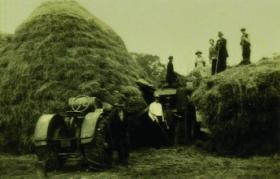Good but infuriating
Published in 20th-century / Contemporary History, Issue 2 (Mar/Apr 2008), Letters, Volume 16
Members of the Pearson family at work on their land at some time before the killings. (RTÉ Stills Library)
Sir,
—I enjoy your magazine very much. It’s always full of good readingand interesting articles. However, it can also be infuriating (notnecessarily a bad thing from an editorial point of view). I’d like topoint out a few irritants from the two most recent issues.
What are extremely lengthy—four pages in all—reviews of Long Day’sJourney into Night and Kings doing in a history magazine (HI 15.6,Nov./Dec. 2007)? There may be some excuse for Kings, as it has somelink to social history, but the O’Neill play looks as out of place as areview of Kylie Minogue’s new album.
I enjoy a good nationalist paranoid rant as much as anyone, but Liam ÓRuairc’s review in the same issue of Paul Bew’s Ireland: the politicsof enmity made little sense. How about his take on partition? ‘It isinconceivable that face-to-face negotiations between Republicans,Nationalists and Unionists would have produced the same settlement.’Since unionism was predominant in the north, nationalism in the south,and these allegiances were completely at odds with each other,partition was the only sensible option. I’d love to know what solutionÓ Ruairc thinks Patrick Pearse, John Redmond and Edward Carson wouldhave come up with if they’d all sat down together without those nastyBrits getting involved. Also, regarding his conspiracy theory aboutBritain still having a ‘strategic interest’ in Northern Ireland (in2007!), the only source he can quote is ‘G. R. Sloan, deputy head ofStrategic Studies at the Britannia Royal Navy College in Dartmouth’. Itcan’t be pleasant for Mr Ó Ruairc to sit up in Belfast with a UnionJack flying over City Hall, but I think he should control hisprejudices when he’s writing for the more dispassionate readers ofHistory Ireland.
And if I could dip my toe (or possibly pen) into the Coolacrease debate. . . There was much to applaud in Brian Hanley’s piece on the subjectin the latest issue (HI 16.1, Jan./Feb. 2008). But he seems to attemptto justify the IRA campaign in the 1919–21 period by claiming that ithad wide popular support. However, most of the population who wereunwittingly caught up in the war between the IRA and the Black and Tanswanted little to do with the conflict. Robert Kee writes in The GreenFlag: ‘The ordinary small farmer might at any moment be called out fromhis house by the revolver-carrying IRA to dig trenches across roads forthe sabotage of police and military transport, and a day later beforced out at bayonet point by the police and military to fill them inagain’. Tom Garvin has written that the make-up of peoples’ allegiancesin the country at the time was 25 per cent actively nationalist, 25 percent actively unionist, and the remainder mildly nationalist. Only themost die-hard republican would have supported the IRA’s armed campaign.A vote for Sinn Féin was not necessarily an endorsement for violence.The popular newspapers of the time, such as the Freeman’s Journal andthe Irish Independent (not to mention the more unionist Irish Times),were appalled by the actions of the IRA. Even elected Sinn Féinrepresentatives, especially early in the conflict, distanced themselvesfrom the more bloody affairs. No one suffered more at the hands of theIRA than the native population.
True, the British authorities had shown little respect for democracy bydenying the nationalist desire for Home Rule. But there were very fewelected governments in the world at the time, and both the 1916 Rising(which had no popular mandate) and the later war on the Free State bythe anti-Treaty forces (who ignored the fact that the Treaty had beenpassed in the cabinet, the Dáil and by popular mandate in the 1922general election) showed that it also held little attraction formilitant Irish nationalists. Twenty-five years later, after the horrorsof the Second World War, democracy was largely accepted in WesternEurope, and Britain gradually withdrew from her imperial possessions.If Irish nationalism had waited for a few more years, the horrors ofthe War of Independence and the Civil War could have been avoided andindependence may well have been achieved by more peaceful means. Wouldthis wait have been worth it? I believe so. Let us not forget thelegacy of the 1916 insurrectionists and their followers: an Irelandthat was poverty-stricken, bankrupt, repressive, isolated, anddominated by a reactionary Catholic Church—not to mention the countlessvictims of violence. No wonder emigration seemed the most attractiveoption on offer. John Dillon wrote in 1925: ‘My God, I thought I wouldnever live to see what is happening today under an Irish government.When we look back on the days when we were oppressed by England itwould look like paradise if we could get the same sort of oppressionnow.’ The IRA’s war was a disaster for the country. I could point outto Brian Hanley that the difference beween sectarian murder and ethniccleansing is merely one of scale. I doubt if the distinction would havebeen of much concern to the families of the ten Protestant victims ofIRA sectarian killings in West Cork in April 1922. Dr Hanley states:‘Claiming that [ethnic cleansing/genocide] occurred in Irelanddiminishes the suffering of those who have really suffered ethniccleansing and genocide in parts of the world’. Quite obviously itdoesn’t. One presumes that victims like these would have great empathyfor anyone who died needlessly because of the simple reason that theywere of the ‘wrong’ religion.
—Yours etc.,
COLM TOWNLEY
Dromiskin, Co. Louth
















